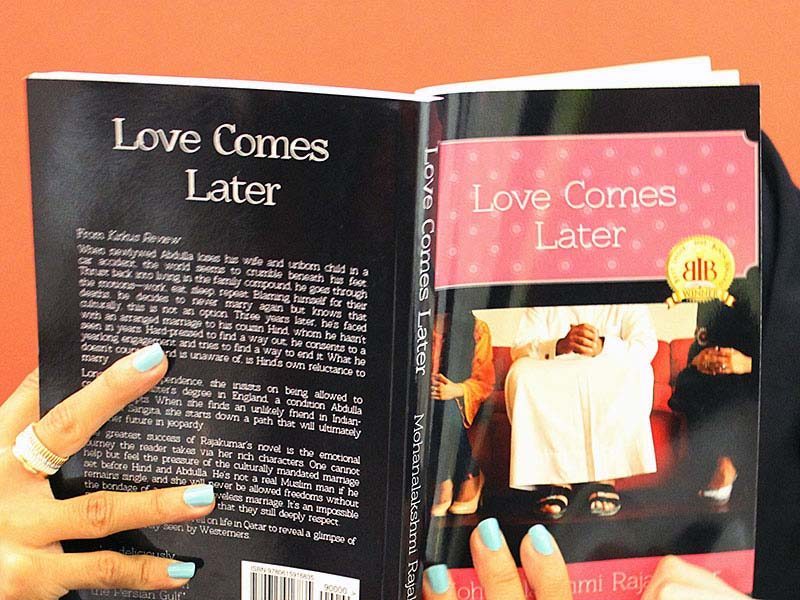
A government ban of a fictional book set in Qatar has raised new questions about importing published materials here, and what’s permissible under the country’s opaque censorship rules.
Long-time resident Mohana Rajakumar was recently told by her distributor that her latest book, Love Comes Later – a fictional story about contemporary Qataris with traditional values who are working to satisfy their personal and social requirements – had been rejected by the Ministry of Culture for sale in book stores.
Rajakumar – a published author as well as an assistant English professor who has lived in Qatar for nine years – said the government has not said why her book was banned.
She told Doha News that she’s keenly aware that certain topics, such as sex, politics and atheism, are taboo in local literature, and thus avoided these subjects when composing her book.
“I didn’t restrain myself … but I wrote it with this cultural sensitivity in mind,” she said.
However, the book is a love story that includes a scene in which an engaged Qatari man kisses an Indian American woman who is not his fiance.
Rajakumar said she proposed changing that passage for the “Qatar edition” of her book, but did not receive a response to her offer.
A representative from the Ministry of Culture told Doha News that while books about sex and religion raise red flags, there is no blanket ban on publishing material about Qatar or its culture.
However, “an author has to be respectful of (the country’s traditions),” he said.
Confusion
While the government has pledged to speed up the approval process for importing books, Qatar’s censorship rules remain a mystery to many residents who have attempted to bring published material into Qatar, only to have it seized by customs officials for unclear reasons.
On the other hand, there are some who advocate for stricter rules, such as a group of Qatar University students who complained about “inappropriate” titles in their school’s library catalogue.
Debates over censorship are also taking place elsewhere in the region. In Saudi Arabia this week, one of the country’s leading publishing houses was recently expelled and had their materials removed from its booth at a popular book fair.
Rajakumar said her distributor told her that the book was likely rejected because it was set in Qatar – something she said she finds difficult to accept.
“I love Qatar. I met my husband here, I’ve had two children here (and), I feel that I’ve done everything I could to ensure a quality, representative book is out there. It seems there is a discouraging message going out to writers.”
Plotlines
Love Comes Later tells the story of a newlywed Qatari man who loses his wife and unborn child in a car accident. Despite a desire to remain single, his family pressures him into an arranged marriage with a cousin who secretly has her own reservations about the relationship.
They agree to a lengthy engagement period, during which the cousin goes to England to complete her master’s degree. There, she befriends an Indian American student, and her brother, which leads to romantic and emotional complications, especially when her fiancé comes to visit.
Rajakumar said she spent a year developing the manuscript and a couple more years soliciting feedback from roughly two dozen male and female Qatari “beta” readers who told her that she had accurately captured their culture’s nuances.
She said she released the novel in e-book form in the summer of 2012 on Amazon, where it was downloaded approximately 1,000 times.
The first print editions were printed last November, and Rajakumar began selling it at book fairs and other events. She said she received a positive reception and engaged a distributor to get her novel into local book stores, which requires approval from the Ministry of Culture.
The book was submitted to the authorities in early February. After a month of follow-up inquiries, Rajakumar said she was simply told by her distributor that the book had been rejected.
What’s taboo?
According to one long-time local book seller, who asked not to be named out of fear he would face repercussions from ministry officials, the government is sensitive about anything that could damage Qatar’s image.
Apart from obvious topics such as sex, the bookseller said there are few absolute red lines. Instead, he said material is judged in the context of the overall publication:
“You have to put yourself in the (ministry’s) position – what can upset them?”
He said the ministry does not issue formal rejection letters – doing so would be an admission of censorship – and only notifies distributors when a book is approved, a process that typically takes one to four weeks.
The book seller added that the ministry will only offer a judgment on a final book and does not offer authors any guidance or guarantees that it would approve a publication if it is written a certain way.
This may explain why Rajakumar’s offer to rewrite certain passages went unacknowledged, although she said it was her understanding that publishers could present manuscripts for review.
What’s next
While Rajakumar continues to try to engage ministry officials and discuss ways of getting her novel on bookstore shelves – as well as clarify whether she can continue direct sales to readers – she is also thinking about a sequel to Love Comes Later.
How that novel comes together, however, largely depends on what she can learn about the ministry’s guidelines. She said she’s seeking clarity so she doesn’t invest years working on a locally set novel that can’t be read in Qatar:
“If I know that two years from now, that this book is not going to be sold, it may change how I write it. If I know that the book is not going to make it on the shelf, regardless of what’s in it because of where it takes place, maybe it will be different.”
Thoughts?







